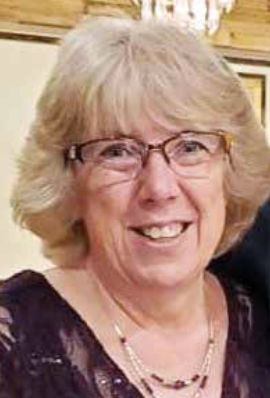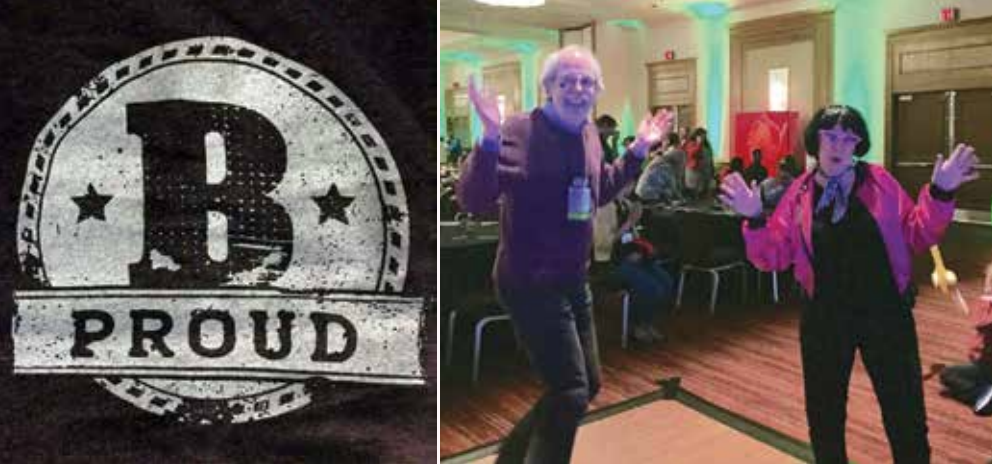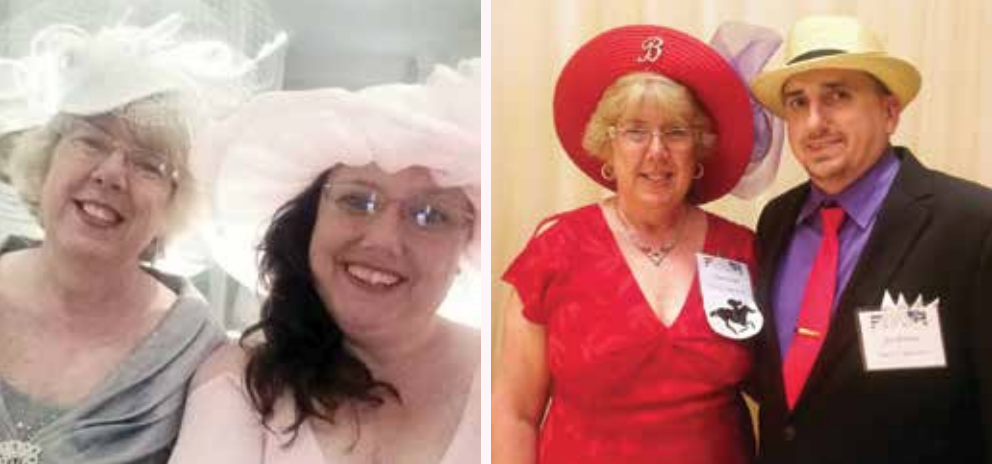Marie Ferrell
Here Comes the Fun!
By Renae Baker
She’s a Mama Hen. You may have found yourself under her wing at some vulnerable point in these last 20 or so years. Coalition members describe her as a “fun” person to be around. You may have heard the story of her dressing like John Travolta, in GREASE and dancing with Dr. Clark at a Coalition event. Her name is Marie.
I sat down with her over Zoom and got to witness, firsthand, that Marie is a fun lady! As a fan of Lily Tomlin’s, I assure you it is high praise of Marie when I say that her spirit and personality reminded me of the legendary comedic actor. Her whimsical turns of phrase and buoyant expressions gave my cheeks a workout!
In some people, challenging childhoods create in them a steely, protective armor. Marie, at 64, continues to choose humor to get her through. More than once, during our interview, she said, “I like to have fun!” Now residing in Beach City, Ohio, with her husband of 20 years, Chan, and their four Chihuahua “children,” Babi, Sissy, Zoe and Ruby, Marie is originally from Akron. She knew, from an early age, that she was a carrier of hemophilia B, because her father suffered greatly from it.
“It was really bad,” Marie admits. “He was crippled by it. He was in a lot of pain. It was real scary seeing the ambulances come take him away, and I was the oldest of four kids.” Marie became a caregiver at an early age for her father and younger siblings, and she has continued to not only care for others, but to enjoy the practice. Marie is a strong Christian. “Jesus is a big part of my life,” she states with - to quote a hymn - “blessed assurance.” She met her dear husband at church, and I am charmed to learn that she named their children Mary and Joseph!
Although Marie knew she was a carrier, she looked forward to having children. She thought that her childhood experience living with her father, as he navigated life with severe hemophilia B, would be sufficient preparation to have a baby boy with it. She thought she was tough. “But no,” she concedes. “With Dad, he was hurting, but the little boy is screaming, ‘Help me, Mommy! Help!’ And that is bad…” The memory of it seems to squeeze her heart all over again. She snaps out of it quickly, “So that’s the difference with that!”
When her son Joey was born, the doctor advised her that she didn’t need to have testing done on her baby; that within a couple of months she would just know. “And didn’t I know!” she says like a punchline. “He started crawling, he hit his head, and there goes a big knot. He started screaming because of the knee bleeds.” Joey was diagnosed with severe hemophilia B with a level of less than 1%. We touch on the guilty feelings that carrier mothers often experience when seeing their children suffer. “Yeah! I never would’ve wanted him to hurt,” she states, and then pivots, “but even Joey said, ‘It’s not your fault, mom. You gave me life!’” As challenging as all of that was, the most harrowing parenting experiences she has had occurred after Joey grew into an adult.
“About 18 years ago, he was in a bad car accident,” she begins. “A big Mack truck side-swiped his car.” At the time, Marie was working as an administrative assistant for the Akron Metropolitan Housing Authority. “They called me from work, and it was just horrible.” Joe was about 24 years old. Marie was told that he was alive, but that he would likely be “a vegetable.” He recovered much better than that, but he is living with a Traumatic Brain Injury.
They have also learned that he has an eye condition called retinitis pigmentosa, which is a progressive vision loss which might include blind spots and loss of peripheral vision.
“It’s genetic!” She blurts out. “I had no idea! The eye doctor said that people with hemophilia get it. I said, ‘Get outta here!’ I’d never heard that before in my life.” Humor intact, Marie makes a face and says, “Ya go, ‘Hey, what’s up with this genetic stuff?’”
Their eye doctor is conducting a study with a DNA panel. They signed up and are expecting to learn more when more participants have signed on. Marie and Joe were stymied by the news and questioned how it could be genetic when they’ve never seen the condition in the family. They were told it could go back hundreds of years. “DNA is DNA.”
“Wow,” I say. “He must feel like he won the wrong lottery.”
“He’s come along quite well,” Marie assures me. “He lives in his own apartment and has five cats.”
I turn the conversation back to Marie. “You knew you were a carrier, growing up, but when were you actually diagnosed with hemophilia B?” I ask.
“So, I’m gettin’ older, right?” she starts. “We’re all gonna die. We’re gonna die when God decides we’re gonna die. But then she remembered her scriptures. “Then I said, ‘Hey, let’s not be foolish. We’re supposed to be wise. I’m gonna get tested.’”
Marie had been tested in her twenties, and her clotting factor result was 30%.
“As I got older, I said to myself, ‘What if I have a heart attack? What if I have to have my guts or gallbladder taken out? Or a hysterectomy? Now, nothing is wrong with me. I’m pretty healthy, but better to be safe than sorry. So I got tested, and they said I was 50%.” She was shocked to learn that people’s levels can change. “So! They’re calling me ‘30-50’ now and told me that if I ever need an operation, to call the HTC. Well, here it was time to do my leg, whoo hoo!” she feigns celebration. “I had never had factor until last year, because nothing was that bad.”
Marie briefly explains that the nurse administered the factor for her knee replacement surgery, which she describes as “not fun.” Afterward, the nurse said, referring to her reaction to having been treated with factor, “Now, wasn’t that better?” Marie, not having anything to compare it to, didn’t know how to answer.
“But I had gotten a tooth pulled before. It bled like sump’m! For days! But I thought, ‘Well that’s what happens when you get your teeth pulled.’” Marie had a second tooth pulled recently. “But this time, I had factor!” She says with an undertone of “Aha!” “I was so shocked! I didn’t hardly bleed at all, and I said, ‘There ya go!’ So now I know what factor really does!”
Marie recalls infusing Joey as a child, and then again when he was an adult, healing from injuries. “Now I’m gettin’ ready to go to ‘Butterfly School’ myself! I need to learn to self-infuse,” she says with a bit of enthusiasm. Shout out to Nurse Hope. Marie has seen you teach self-infusion at Coalition events and is impressed. You may be getting a call!
I ask Marie for how long she’s been involved in The Coalition For Hemophilia B. “I didn’t know the Coalition existed. I was at a smaller, local chapter event, and I saw Kim and Dr. Clark sitting there! I didn’t know them, and I said, ‘Oh! Look at this!’” They told Marie about The Coalition for Hemophilia B, and how it had been in existence for several years. Marie and her son Joe have learned such a tremendous amount of life-saving and quality-of-life-enhancing information through the Coalition that, “I was in awe!” she exclaims. “And then started a lot of good friendships, and I was like, ‘Where’ve you been all my life?’ It’s too bad we weren’t introduced long ago.”
Marie is especially moved when she remembers older Coalition men playfully interacting with their blood brothers at an event. She wished her father had had those relationships. “Having a bleeding disorder can make you feel real isolated. The Coalition is so good at bringing us together. I just wish I’d known about them while my dad was still alive.”
Marie sees young Coalition mothers and their children. She marvels at how these children will likely not face the same joint damage as the older members. “I’m so happy for them!” she says with seriousness.” They shouldn’t have to.”
Marie thinks about her experiences with mild hemophilia B and her son’s and father’s lives with severe hemophilia B. Her passion ignites when she considers the value of the generations of sufferers, on whose bleeds, ravaged joints and organs, and deaths scientists have based their research, and how the younger generation, who benefits so greatly from the research, may be uneducated about what came before and could come again.
“I think they’re forgetting that,” Marie worries. “They should never forget those older guys dying. They should never forget.” She is referring, of course, to the blood scandal in the 1970’s and 80’s, in which thousands of men with hemophilia contracted HIV and hepatitis C from contaminated blood products, horrifying and breaking the hearts of the community with the untimely deaths of multitudes of loved ones and compounding the pain and suffering of others with nightmarish, sometimes insurmountable health challenges. Marie believes that the documentary Bad Blood should be required viewing for every member of the bleeding community.
It is quickly becoming a different landscape for hemophilia sufferers, with kids and adults alike having access to prophy, allowing them to play sports and other activities not dared just a few years ago. Maternal hearts still ache for their children’s misery of receiving treatment through a port or from crawling across the floor. However, just as we are seeing reversals in human rights happening in our “land of the free,” it is not out of the realm of possibility that access to the treatment that has made it possible for today’s youth to enjoy more active, less painful lifestyles, might also become threatened.
Marie senses that much of today’s youth look at these older men with hemophilia B and don’t realize how special, rare and brave they are. It is their suffering and advocating for the community that have made advancements in treatment a priority, making it possible for today’s “young bleeders” to live more active lives with less suffering. Marie wants to encourage the younger generation to really consider the major contributions these people have contributed to theirLives.
“I think they look at them and think, ‘They’re old. That’s how old people are,’” Marie supposes. Then she asserts this uncharacteristically grave caution; “Be aware of what could have been or what could be! Just think about kids on the other side of the world, running around, screaming with no factor. That could happen Here.”
I get the idea that that was a rare serious moment for Marie, but it was an important idea that she needed to express. Marie’s appreciation for the men who have lived through such tribulations to ages far beyond what the doctors told their mothers to expect is reciprocated. I have talked to many of these men for whom it is a front-burner issue that women bleeders are not being taken seriously enough by all hematologists. They are incensed that their blood sisters are being denied the same rights to prophy as their own sons only by virtue of their sex. I ask her how she feels about the men advocating for the women.
“It’s good! We need that! They’ve already lived through it where no one was listening to them,” Marie nods in solidarity.
Marie thinks about the stories she’s heard from women bleeders, and she launches into one of her determinations; that more people should be extending themselves to others who may not be connected enough to the resources that will give them a higher quality of life. She starts by considering unsuspecting women having what they will later describe as “bloodbaths” for birthing experiences.
“Why should there be a bloodbath?” She asks, incredulously. “I think they [the doctors] should tell women where to go.” With her inner light flaring like a Fourth of July sparkler now, she coaches us to be on the lookout for people who may not realize they have hemophilia yet. “Maybe you’ve heard someone say, ‘I think she has hemophilia.’ I think - it doesn’t matter what state - someone should take them under their wing. Give them people to call. Especially when people are of childbearing age. They might know they have hemophilia B, but not know about the Coalition. Everybody should be telling them about the Coalition. If the HTC doesn’t tell you about the Coalition or FHS or National, they aren’t going to know. Just like I didn’t know.”
Additionally, Marie urges, “Get out there. Get tested. Talk to people. Go to conferences. Be educated.” But she doesn’t stop there. She adds something I haven’t heard before, “Invite people to conferences; even if it’s a promotional dinner. Go to it. Learn.” “So, you’re all about extending yourself,” I reflect back to her. “Are you saying, ‘Don’t wait for an invitation to reach out to people?”
“Yes. I like to help people. That’s one of my passions,” Marie jumps in. “I’m a caregiver to many people. It makes me happy. It’s what I’ve done all my life. Any way I can help anybody, I do.” She uses me as an example. “You’re a writer, and you can also tell somebody.”
Indeed, I am, Marie. I’m happy to help you get the word out, so more people may join you in the fun!




